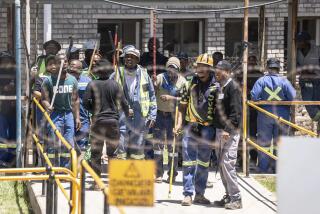Soviet Coal Miners Strike, Demand Gorbachev Resign
- Share via
MOSCOW — Tens of thousands of Soviet coal miners in the Central Asian republic of Kazakastan went on strike on Friday, demanding President Mikhail S. Gorbachev’s resignation and higher wages.
About 70,000 miners from 23 of the 26 mines in Karaganda, the country’s third largest coal producing basin, stayed out, said Pyotr P. Shlegel, chairman of Karaganda Territorial Council of the Coal Industry Trade Union, which called for the strike.
“The people have been driven to despair,” Shlegel said in a telephone interview. “The miners are determined to defend their interests and carry the strike through.”
The official news agency Tass reported earlier in the day that 20 mines had participated in the strike. Shlegel said that three more mines had started striking later in the day and he expected that two more mines would also join.
There also were scattered strikes reported in the Donetsk Basin area of the Ukraine and a threatened Monday walk-out in central Siberia.
In Karaganda, a one-day strike had originally been called. But the miners’ demands for higher salaries, compensation for price hikes and the resignations of Gorbachev as well as the national Parliament were not met, so the strike was extended through Monday, making it a four-day strike, Shlegel said.
“Since no compromises have been reached today,” Shlegel said, “the decision has been made to continue the strike to March 4, inclusive.”
Shlegel said this strike is important because it is the first strike held since the formation last fall of the 80,000-member Independent Union of Miners.
“The unwillingness of the government to resolve our problems and recognize our trade union added oil to the fire,” he said. “The situation is tense. . . . We have the feeling that if the strike gets out of control it can lead to (violent) clashes.”
This was also the first major coal miners’ strike that will last more than one day since a massive coal miners’ strike thrust the country into its first major labor crisis during the summer of 1989. Half of the Soviet Union’s coal production was temporarily shut down when 500,000 miners went on strike in western Siberia and the Donetsk Basin of southern Ukraine. They resumed work only after the government promised to fulfill their demands for better working conditions and pay.
A year after that strike, miners across the country again held a 24-hour work stoppage to protest the Kremlin’s failure to deliver on its year-old pledge to ease their lives.
But Friday marked the first time miners have tried to oust Gorbachev.
Shlegel said the strikers in Karaganda have encountered fierce confrontation from local officials. The local legislature is considering economic and administrative sanctions against the miners, he added.
Miners in other regions were not as successful in walking out. In the Ukrainian city of Donetsk, the center of the country’s largest coal mining region, the strike committee decided at the last minute to call off a strike, because they had not been able to get enough petitions to hold it legally.
Under the law, 75% of all workers must vote in favor of a strike before it can be held, Yuri Bolderyev, a chairman of the miners’ strike committee in Donetsk, said.
“With 20% of the miners on vacation at one time and other miners out sick or on business trips, it’s impossible to get enough ballots in favor of the strike,” Bolderyev said. “Almost everyone who voted was for the strike, but we couldn’t fulfill the conditions of the strike law.”
Only about 15 of the 225 mines in the Donetsk Basin went on strike and not all of those had totally stopped working, Bolderyev said.
“Vremya,” the nightly television news program said, however, that only five of the 214 mines in the Donetsk Basin were affected by the strike.
In the central Siberian region of Kuznetsk, miners said they would hold a one-day warning strike Monday to demand higher pay and Gorbachev’s resignation.
More to Read
Sign up for Essential California
The most important California stories and recommendations in your inbox every morning.
You may occasionally receive promotional content from the Los Angeles Times.













